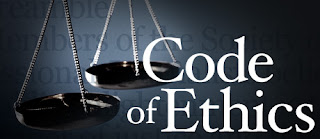Week 8- Moral Minefields: Legal and Ethical Dilemma
Week 8’s presentation was by Josephine and Yale. They covered the topic on moral and ethic issues surrounding journalism. Yale kick-started the presentation by mentioning how CAR (computer-assisted reporting) has affected the laws governing journalism. CAR is in essence the use of computers to gather and analyse information for writing a news report, for example through the use of email interviews and sharing database in the internet. As such, the legal line have blurred as the world of internet is a tough sphere to control and monitor.
Yale stated that it is necessary for journalists nowadays to familiarise themselves and develop a broad understanding of the legal aspects of their job. For example, journalist should be cautious in avoiding asking defamatory questions or comments even in email interviews as this act is sufficient for one to be charged. I agree with Yale that it is highly crucial for journalists to keep themselves up-to-date. At the end of the day journalists are humans and not superheroes; we need to learn how to protect and defend ourselves.
Josephine carried on explaining the ethical dilemma journalist face. In her own words, ‘there is no distinct line to differentiate (ethic principles), it is dependent on one’s upbringing and moral values; Legal doesn’t mean that it is moral’. Josephine then gave a couple of examples of journalists who stood by their moral ethics but subsequently paid the price, some even with their lives.
According to Josephine, it is unfair that journalists who ‘break the law’ to obtain secret information and then expose these information ‘for a greater good’ gets punished. However, in my opinion, to consciously commit a crime to expose another crime, regardless of the severity of it, is in itself unjustifiable. We can argue that these journalists have noble motivations and ‘greater purposes’ behind their unlawful act, but at the end of the day, the law must remain consistent throughout all circumstances. Otherwise, its effectiveness will be reduced tremendously over time when exceptions are made.
-Andy Wang

Hey Andy,
ReplyDeleteI think that there are 2 sides to a coin and it is usually subjective. In my opinion, I feel that to commit a small mistake for a greater good might just save the world!
For instance: a certain journalist tap on a group conversation between a few terrorists - this action might save a global disaster, don't you agree? If that's the case, is it justifiable to sacrifice / jail the journalist who tapped on the conversation? Or, would you rather - the journalist just walk away and pretend not to hear anything - so as to do himself justice?
Thanks for your reply. I think it's true that in the example you gave above, it is evident that saving the world is for the greater good. It is really hard to nail media ethics down to a set of do-s and don't-s. That is why ethics in itself is subjective and governed by different set of principles.
ReplyDelete